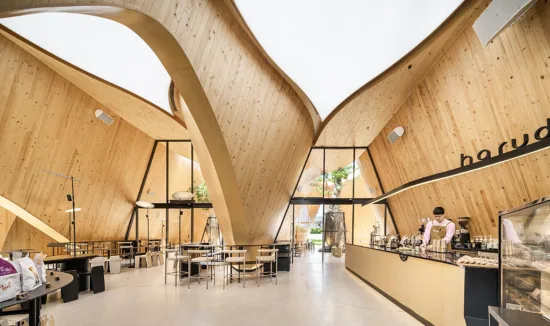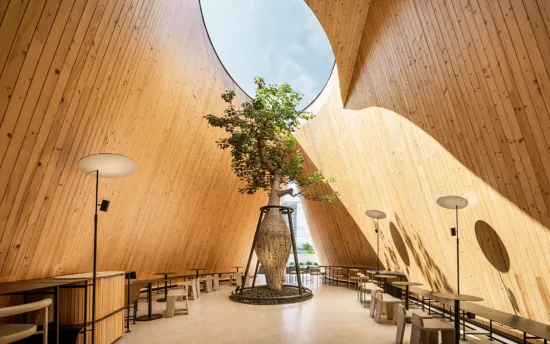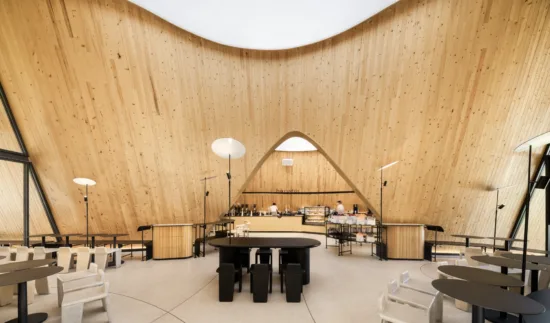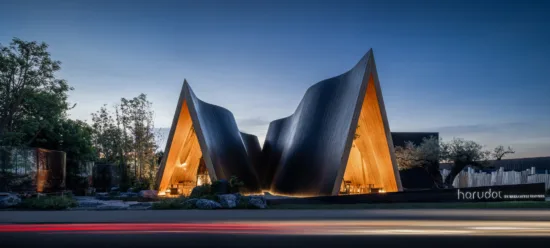
We discover the harmonious blend of Japanese-inspired aesthetics and exceptional coffee quality at Harudot Café, a creation of Nana Coffee Roasters.
BY VASILEIA FANARIOTI
SENIOR ONLINE CORRESPONDENT
Photos courtesy of IDIN Architects
In the heart of Chonburi, Thailand, nestled within the vibrant tapestry of beachside life, lies a sanctuary where coffee aficionados and design enthusiasts converge. Harudot Café, created by Nana Coffee Roasters, emerges as a beacon of creativity and collaboration, seamlessly blending Japanese-inspired aesthetics with a profound respect for nature.
Renowned for its unique approach to both coffee and architecture, Nana Coffee Roasters has a distinguished reputation among enthusiasts. With each location boasting its own distinct design and ambiance, the brand has carved out a niche as a purveyor of exceptional coffee and immersive experiences.
I recently had the pleasure of chatting with Wasin Kusakabe, a pivotal figure within Nana Coffee Roasters. Serving as an executive, coffee roaster, barista, and strategist, Wasin wears many hats within the company. Additionally, we reached out to the visionary designers behind Harudot Café to gain insight into the creative process that brought this captivating space to life.

A Tale of Collaboration and Creativity
The genesis of Harudot Café stems from a unique collaboration between Nana Coffee Roasters and the building’s landlord, who has an unwavering passion for botanical beauty. Inspired by the Japanese concept of “haru,“ meaning “spring,“ and “dot,“ symbolizing a starting point, the café unfolds as a narrative of renewal and exploration. Wasin sheds light on the vision behind Harudot, stating, “We wanted to create a destination that not only captivates visitors but also pays homage to the landlord’s love for distinctive plant forms.“
Designed by IDIN Architects, the café’s exterior exudes understated elegance, with sleek black gable forms juxtaposed against warm pine wood walls. As visitors come through the entrance, the space gradually unfolds, revealing a dynamic interplay of curves and contours that invite exploration.
IDIN Architects, describing their design philosophy, share: “We sought to infuse humble simplicity with meticulous attention to detail, drawing inspiration from Japanese culture.“ This ethos is represented by the seamless integration of nature into the café’s architecture: a majestic baobab tree is nestled within an inner court. Here, the gable form of the structure is ingeniously pulled apart, allowing the tree to ascend—a poignant metaphor for growth and vitality.

Crafting an Atmosphere of Wonder
Every aspect of Harudot Café is meticulously crafted to evoke a sense of wonder and delight. From the continuous ribbon-like seating arrangement to the terrazzo flooring adorned with flower petal patterns, each detail tells a story of playful sophistication.
IDIN Architects elaborates on their design choices, saying, “We wanted to create a space that engages the senses and invites exploration. The circular motifs and embedded quotes in the floor serve as subtle invitations for patrons to discover hidden nuances within the café.“
Behind the captivating aesthetics lies the heart of Harudot Café: the celebration of exceptional coffee. As a daughter-brand of Nana Coffee Roasters, Harudot upholds the same unwavering commitment to quality and excellence. Wasin reflects on the café’s ethos: “At Nana Coffee Roasters, our philosophy is simple yet profound: We never compromise on quality. From the selection of beans to the brewing process, every step is infused with passion and dedication to delivering the finest coffee experience.“

Rediscovering Slow Living
As I delved into the intricate details of Harudot Café, I couldn’t help but marvel at the seamless integration of culture, design, and nature. From the organic flow of space to the whimsical embellishments adorning every corner, it’s evident that every aspect of this café has been thoughtfully curated to evoke a sense of wonder and joy.
As Wasin puts it, “Harudot isn’t just a café—it’s a hub for connection and community. We envisioned it as a space where people can come together, share stories, and forge meaningful relationships over a shared love for exceptional coffee.“

In this age of fleeting moments and digital distractions, a well-designed coffee space serves as an oasis—a sanctuary where time slows, conversations flow, and memories are woven into the very fabric of the environment. It’s a reminder that in a world saturated with noise, the simplest of pleasures—a perfectly brewed cup of coffee in a thoughtfully designed setting—have the power to nourish the soul and ignite the imagination.
ABOUT THE AUTHOR
Vasileia Fanarioti (she/her) is a senior online correspondent for Barista Magazine and a freelance copywriter and editor with a primary focus on the coffee niche. She has also been a volunteer copywriter for the I’M NOT A BARISTA NPO, providing content to help educate people about baristas and their work.
Subscribe and More!
Out now: It’s the April + May 2024 issue of Barista Magazine! Read it for free with our digital edition. And for more than three years’ worth of issues, visit our digital edition archives here.
You can order a hard copy of the magazine through our online store here, or start a subscription for one year or two.


